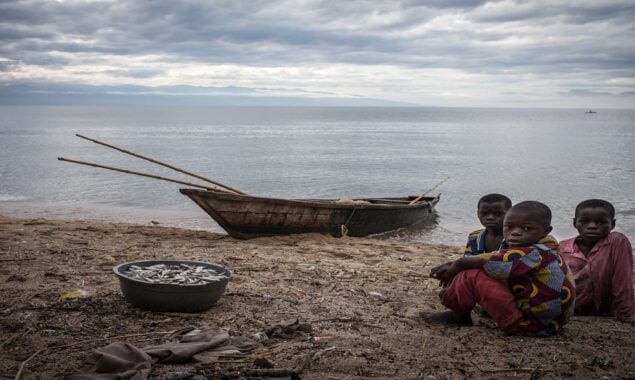
Amissa Irakoze has never been afraid of Lake Tanganyika in her 40 years of living on the water’s edge. Floods were often, even lapping at her front door, but they always subsided eventually.
What happened in April 2020 was something she could never have predicted. Irakoze returned home from laboring in the fields to find her home in northwest Burundi flooded and her ten children disappeared.
“I screamed, ‘My children, my children, my children!'” the single mother recalled, miming a gesture of desperation.
“The children were swept away, but some people nearby who could swim used boats to fish them out, and brought them to me.” All miraculously survived.
Two years later, the floodwaters have not receded and Africa’s second largest lake remains at highs not seen in decades, pushed outward by erratic and extreme rainfall linked to a warming planet.
Irakoze and her family languish in a makeshift camp behind the lakeside city of Gatumba.
Those driven off their land have little to keep them busy, their children passing their time playing in the camp’s alleyways.
“We used to farm, we used to do jobs that helped us survive. But since we’ve been here we’ve done nothing,” said Lea Nyabenda, another mother of 10 who arrived at the camp two years ago.
“Life is miserable, and the shelter and lack of food makes me anxious. Sleeping in a place like this when we had a beautiful big house,” she said.
Gatumba has grown significantly in recent decades thanks to its proximity to the Democratic Republic of Congo, Burundi’s massive neighbor to the west.
As cross-border trade boomed, construction in Gatumba has proceeded at a clip but some new dwellings sprang up on a watery plain where building was prohibited.
Nyabenda’s old neighborhood was one such place.
As the lake rose, her suburb turned into a swamp. Some homes remain intact, but most are watery ruins covered in tall grass.
“This is where my house used to be,” said Nyabenda, pausing before a mound of earth and scraps of wood, and pointing out where the bedrooms and living spaces used to be.
“I avoid coming here. I can feel the tension rising.”
The neighborhood has a ghostly emptiness.
Schools and commercial establishments “have been destroyed, there are also crops, plantations that have been flooded,” said Geoffrey Kirenga, country director for charity Save the Children.
Some 65 percent of those displaced by the lake are children. Most no longer have access to school or any form of learning, and have started working to support their families.
“Children are getting involved in fishing, which is dangerous. It is unprotected so it exposes them to physical harm,” said Kirenga, looking toward the murky lake filled with hippos and crocodiles.
Save the Children expects the situation to worsen as the rainy season begins in Burundi, which the World Bank ranks the worlds poorest by gross domestic product (GDP) per capita.
Political violence and civil strife drove hundreds of thousands of people from their homes over recent decades in this tiny but densely-populated nation sandwiched between Tanzania, DR Congo and Rwanda.
Burundians are still moving in great numbers but today the driver is not man but nature.
Natural disasters were responsible for nearly 85 percent of the country’s 113,000 internally displaced people, according to the International Organization for Migration (IOM).
Read More News On
Catch all the International News, Breaking News Event and Latest News Updates on The BOL News
Download The BOL News App to get the Daily News Update & Follow us on Google News.




